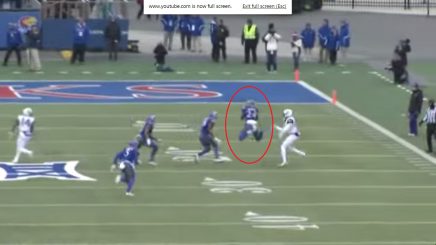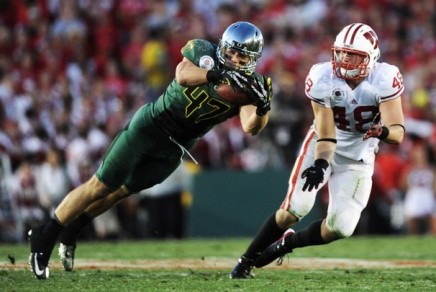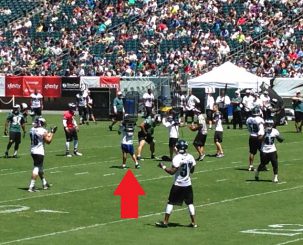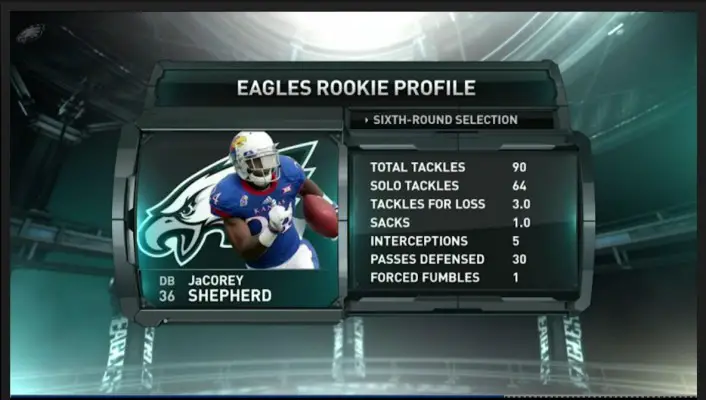The typically astute Jimmy Kempski spotted an interesting number in his profile of JaCorey Shepherd, one of two cornerbacks the Eagles drafted in the sixth round:
The most obvious takeaway from Shepherd’s tape is how many footballs he gets his hands on. In fact, Shepherd had more pass break-ups over the last two years than any other cornerback that was selected in the 2015 NFL Draft. And it’s not as if Shepherd is getting a ton of break-ups only because he was targeted so frequently. According to PFF, Shepherd also had the lowest percentage of targets completed against him among all drafted CBs in the 2015 draft at just 38.6%.
Some corners have a knack for locating the football and making a play on the ball. Some don’t. Shepherd does.

JaCorey Shepherd’s pick six
In another article, Kempski expanded his number crunching to all 31 cornerbacks drafted in 2015. Only six of them had 20 or more pass break-ups in the last two years — and the Eagles drafted three of those guys (Nos. 1, 4 and 6): JaCorey Shepherd, Randall Evans and Eric Rowe.
Important footnote on Rowe: He had 13 break-ups last year and only seven in 2013 — but he was playing safety his junior year, not cornerback — which makes that number doubly impressive. If he had had 13 both years, he would have been second on the list and the Birds would have selected three of the top four ballhawks.
This analysis leads to an obvious question: Why did other teams let two of these guys fall to the sixth round? What else could you want in a cornerback besides breaking up passes? The 40-yard dash time is the biggie, and Shepherd stunk at the Combine (4.65/4.68) due, he says, to hamstring issues. Teams also look for size, ability to shadow receivers, route recognition, and overall tackling.
But sometimes that is not good enough. For two years, the Eagles have suffered with a safety (Nate Allen) and two CBs (Bradley Fletcher and Cary Williams) who had good size and shadowed receivers well but were poor at getting their hands on the ball. The CBs often mirrored their receivers perfectly but couldn’t turn their heads around at the right time or locate and slap away — much less intercept — the pigskin. (They also failed miserably at jamming receivers at the line of scrimmage.)
After Chip’s first two years in the NFL, two years of Fletcher and Williams as the centerpiece of the worst and second-worst secondary in the league, it’s understandable that this focus on defensive backs with ball-handling skills shouldn’t surprise anyone..
Brandon Boykin, however, was a stunning exception in 2013; his six interceptions that year tied for second-best in the NFL after only Richard Sherman, and he had 16 pass break-ups. But he was not the same playmaker last year, and it’s not clear whether that was because he had a down year, was unhappy about not being moved outside, or because teams were afraid to target him. (Likely it was a combination of all three.)

Kiko Alonso wants the ball.
At Oregon, though, Kelly’s teams gained a reputation for a “bend-but-don’t-break” defense — not because they were happy to give up first downs — but because the big yardage opponents inevitably gain against a tempo offense due to having more drives. They were also offset by serious playmaking, including a lot of interceptions from the linebackers, as well as some stellar play from DBs Cliff Harris, Ifo Ekpre-Olomu, Jairus Byrd, T.J. Ward, etc.
In Chip’s four years of coaching the Ducks, they grabbed 77 interceptions while giving up only 32. In 2012, his last year, they picked off 25 passes, including four by Kiko Alonso and two by another linebacker, Boseko Lokombo.
Kelly’s Philadelphia defenses have done very well up front. They led the league last year in forced fumbles and fumble recoveries, resulting in two fumble-return touchdowns. They also did well in batted passes, which resulted in good chances for interception returns. Moreover, they gave up the fewest batted passes in the NFL per Football Outsiders, thanks to coach Kelly’s unique “bug man” device.

The bug men approacheth!
Interceptions were a disaster on both sides of the ball, though. The Eagles gave up tons of picks in 2014 and generated very few. Malcolm Jenkins had three INTs early, but dropped several that he should have caught in the second half of the year. Boykin had only one interception and nine pass break-ups.
The ball-hawking was especially weak given how much pressure the front line was putting on opposing quarterbacks. Even a mediocre secondary, combined with the team’s strength up front, should give the Birds a very stout defense. With the addition of Kiko Alonso, who also got four interceptions in his rookie NFL season, the team is loaded at linebacker (though OLB depth is still suspect).
If the defensive backs actually get good, which might take another year, this could be a suffocating, even legendary defense, and the narrative on Chip Kelly will get even more confused. Last year, the old “Chip-only-cares-about-offense” story was mixed with a good bit of “this offense actually sucks, but defense and special teams are masking the weakness” (which was true).
By 2017, the narrative might be “Bradford (or Sanchez, or Russell Wilson) is just a game manager; the Eagles totally rely on their defense.” And I don’t think Chip would mind one bit. It’s working pretty well for Seattle.
Feature photo from video, philadelphiaeagles.com
Related Articles:
Chip Kelly Update: Everything's Good Again ...
Chip Kelly Update: Wailing and Gnashing of Teeth
Shock and Awe -- The Oregon Ducks' Football Hangover Effect
Despite Lopsided Score, Georgia State "Never Stopped Believing"
Hope Springs Eternal for Ducks
Incompetent Pac-12 Officials: How Do You Miss ALL of THIS?
Mark Saltveit’s newest book is “Controlled Chaos: Chip Kelly’s Football Revolution” (Diversion Books, NY) has been recently released. He is the author of “The Tao of Chip Kelly” (2013) and writes on science, religion, wordplay and political scandals. He is also a standup comedian and the world palindrome champion.

